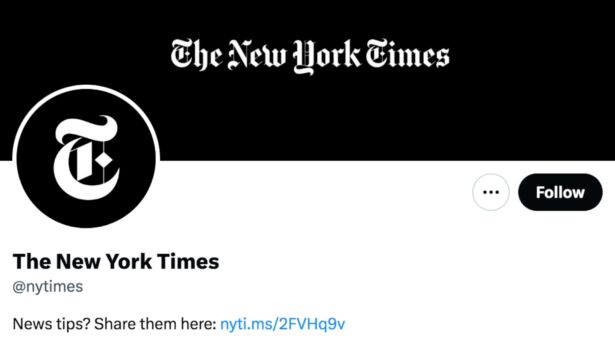Twitter has pulled the verification check mark on the main account of The New York Times after the newspaper said it would not pay a monthly subscription, as the social networking service began to remove legacy check marks for all users on the platform.
Late last month, the Elon Musk-owned company announced a deadline as it urged verified users who wished to retain their blue check marks, or verification badges, to buy a premium Twitter subscription in order to avoid losing the checks on their profiles.
The New York Times, which has nearly 55 million followers on Twitter, said in an article published on March 31 that the news organization would not pay for the verified badge for its institutional accounts.

In another statement on April 2, the publication reiterated that it isn’t planning to pay the monthly fee for check-mark status.
“We also will not reimburse reporters for Twitter Blue for personal accounts, except in rare instances where this status would be essential for reporting purposes,” the newspaper noted.
Musk appeared to comment on The New York Times’ loss of the verification badge in an April 2 tweet, posting disparaging remarks about the publication on the day his company removed the check mark.
“The real tragedy of [The New York Times] is that their propaganda isn’t even interesting,” Musk wrote. “Also, their feed is the Twitter equivalent of diarrhea. It’s unreadable. They would have far more real followers if they only posted their top articles.”
The real tragedy of @NYTimes is that their propaganda isn’t even interesting
— Elon Musk (@elonmusk) April 2, 2023
As of April 3, only the newspaper’s main account had lost its check mark, while other accounts such as its business news and opinion pages still had either blue or gold check marks, as did multiple reporters for the news organization.
According to Twitter’s new policy, the cost of keeping the check mark ranges from $8 per month for individual web users to a starting price of $1,000 monthly to verify an organization, plus $50 monthly for each affiliate or employee account.
Other news organizations who’ve announced that they won’t pay for Twitter’s verified badge include CNN, Vox, the Los Angeles Times, The Washington Post, and Politico, among others, although it appears the only high-profile account to have the symbol revoked, as of April 3, was The New York Times.
Several high-profile people, including Lebron James and William Shatner, have also been outspoken in insisting that they would not pay a monthly subscription to keep their blue check marks, though neither has lost their verification symbols yet.
Twitter’s Verified Badge
Prior to Musk buying Twitter for $44 billion in October, the platform had handed out blue check marks or verification badges for free to verified user accounts, such as to those belonging to celebrities, politicians, government officials, journalists, or other accounts of public interest.
In an attempt to boost declining revenues, one of Musk’s first product moves after taking over the social media service was to implement a paid-in subscription called “Twitter Blue,” which adds a blue check mark to an account and grants users additional features.
However, it was quickly inundated by impostor accounts—including those impersonating Nintendo, pharmaceutical company Eli Lilly, and Musk’s businesses Tesla and SpaceX—so Twitter had to temporarily suspend the service days after its launch.
The relaunched service costs $8 per month for web users and $11 a month for users of its iPhone or Android apps. Subscribers are supposed to see fewer ads, be able to post longer videos, and have their tweets featured more prominently.
Subscribers will still need to meet Twitter’s eligibility criteria to receive or retain the blue check mark, including having accounts that are more than 90 days old and were active within the 30 days leading up to the subscription. They must also show no signs of having engaged in “misleading or deceptive” behavior or “platform manipulation and spam.”
The Associated Press contributed to this report.
